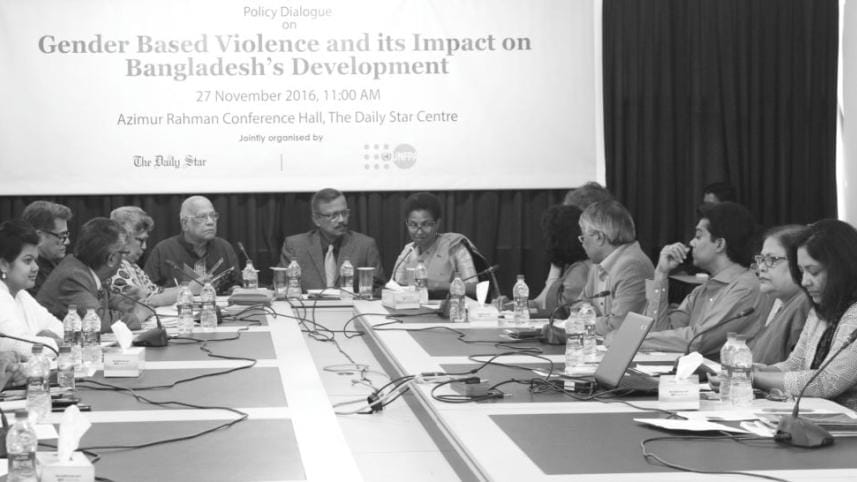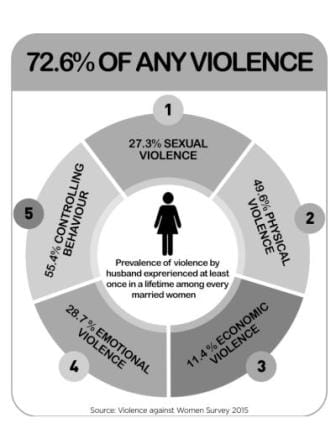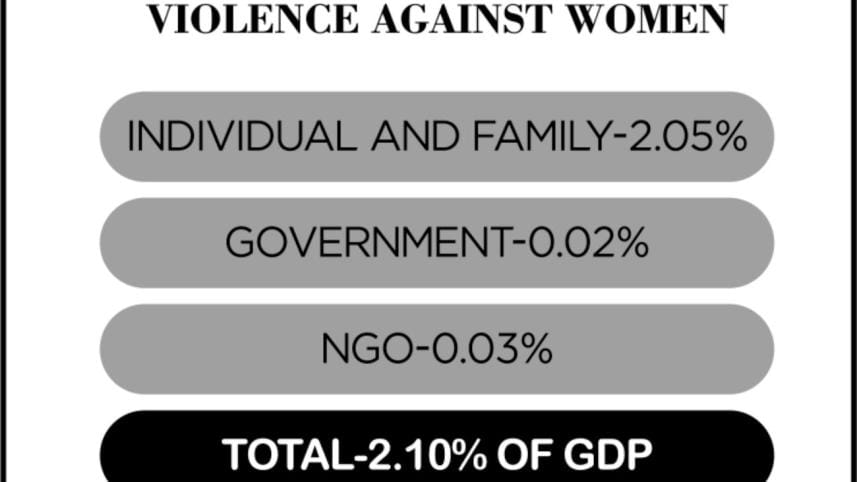Gender Based Violence and its Impact on Bangladesh's Development


An interactive and lively discussion looked into the issue of gender based violence (GBV) and its impact on Bangladesh's development. High level policy makers, development partners, members of civil society and journalists attended the dialogue organized by the United Nations Population Fund (UNFPA) and The Daily Star. There was a strong consensus that finding solutions to reduce and respond to gender based violence is not only vital to the lives and well-being of women and girls, but to the successful implementation of the Sustainable Development Goals and overall development of the country.
GBV is the most pervasive form of human rights violation that women and girls are regularly facing in Bangladesh. The VAW Survey 2015, jointly conducted by UNFPA and the BBS, revealed that 73% of ever married women in Bangladesh have experienced any kind violence by their current husband, 55% reported any type of violence in the past 12 months, and 50% reported physical violence in their lifetime. The frequency and severity of GBV varies across the country, but the negative impact it has on individuals and on families is universal and has direct links to overall development of Bangladesh. Violence against women impoverishes individuals, families, communities and governments and reduces the economic development of a nation. At the individual level as many as 14% of maternal deaths is associated with GBV and at the national level the country loses 2.10% of GDP due to domestic violence (CARE Bangladesh, 2013).
In Bangladesh, GBV persists largely due to deep rooted patriarchal social norms. The worst manifestation of such social malaises as well as the existing forms of GBV is child marriage which is widely prevalent in the country. According to BDHS 2014, about 59 percent of women aged 20-24 marry before they turn 18. Child marriage puts girls at particular risk of sexual, physical and psychological violence throughout their lives, stated the participants. They expressed their deep concern about the draft Child marriage restraint law, recently approved by the Bangladesh Cabinet. The new Act is said to include a special provision allowing child marriage in “special cases”, such as if a girl becomes pregnant “accidentally” or “illegally”, or where a marriage would protect her 'honour'. The participants feared that that such a provision would legitimise statutory rape and encourage the practice of child marriage. Kazi Reazul Hoque, Chariman ,National Human Rights Commission, said that the country has made tremendous progress in many sectors, including women's empowerment, but the proposed Child Marriage Restraint Act, if passed with the special provision, would mar the government's achievements. One of the speakers said that the provision is already in the Marriage Registration Act, and that there is no necessity of incorporating it in the proposed Child Marriage Restraint Act.

The speakers also urged the government to withdraw its reservation on Articles 16 (C) and 2 of the Convention on the Elimination of All Forms of Discrimination against Women (CEDAW), as those are creating barriers for women's empowerment. Article 2 mandates that state parties ratifying the Convention declare intent to enshrine gender equality into their domestic legislation, repeal all discriminatory provisions in their laws, and enact new provisions to guard against discrimination against women. Article 16 (C) dictates that state parties shall take all appropriate measures to eliminate discrimination against women in all matters relating to marriage and family relations and, in particular, shall ensure a basis of equality of men and women. The Constitution of Bangladesh guarantees equal rights for women and men. However, having a reservation on Article 2 contradicts with Articles 10, 19, 27, 28 and 29 of the Constitution of Bangladesh, said the participants.
Pointing to the weakness of the existing efforts for prevention of GBV, the speakers said that access to justice still remains complicated, costly, and lengthy for women and the poor. The VAW Survey 2015 shows that only 2.6% survivors took legal actions after being subjected to physical violence by them. Discussants at the roundtable furthermore pointed to the need for ensuring speedy trials. People want to see what happens to the criminal. If an example can be set, incidents of violence will decrease, said a female student present at the dialogue. She also said that when girls are stalked, they hesitate to go to law enforcers as the police do not take the issue seriously. In response to her comment, Rawshan Sadia Afroze, Additional Superintended of Police and Deputy Director (academic) of Police Staff College said they are regularly organizing awareness meeting with police members on GBV and things are improving. Educational institutions should play a more effective role in change the attitudes and behaviors that cause gender-based violence and allow it to continue within the community, said the participants.
In order to ensure substantive equality for women and to eliminate GBV, all the participants agreed that strong will and leadership from the government is vital. They highlighted the need for strengthening coordination between government and non-government efforts at preventing all forms of GBV. The programme ended with the strong appeal to the government to repeal the provision in the proposed Child Marriage Restraint Act that would allow marriages of girls below 18 under special circumstances.
 For all latest news, follow The Daily Star's Google News channel.
For all latest news, follow The Daily Star's Google News channel.
Comments